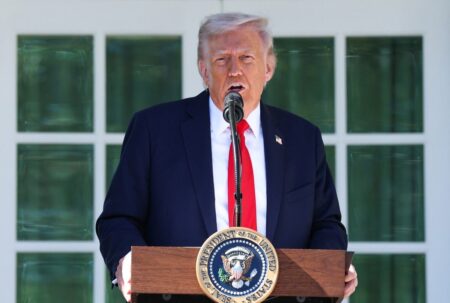Lindsey Halligan, the interim U.S. attorney for the Eastern District of Virginia appointed by President Donald Trump, is facing further scrutiny over a series of text messages exchanged with journalist Anna Bower of Lawfare concerning an ongoing federal case against New York Attorney General Letitia James.
According to screenshots published by Lawfare and reviewed by CNN, Halligan initiated contact with Bower through the encrypted messaging platform Signal on October 11. “Anna, Lindsey Halligan here,” she wrote. “You are reporting things that are simply not true. Thought you should have a heads up.”
The messages were sent with disappearing-message settings and continued intermittently over roughly 33 hours.
Why It Matters
Halligan’s outreach matters because it blurs the line between the Justice Department’s duty of confidentiality and the norms of press engagement.
By directly messaging a reporter about an active prosecution she is overseeing, Halligan stepped outside standard DOJ communication protocols and risked undermining the perception of impartiality that federal prosecutors are expected to maintain.
The exchange, conducted over an encrypted app with disappearing messages, raises questions about adherence to department policy and record-keeping rules, as well as about the independence of a Trump-appointed U.S. attorney already handling politically sensitive cases.
What To Know
Reporter Describes Unusual Outreach
Anna Bower, a senior editor at Lawfare, said she was surprised to be contacted directly by a sitting U.S. attorney about a pending prosecution.
“It’s very much not often that you see a sitting United States attorney who, unsolicited, reaches out to a reporter to talk about something that relates to an ongoing prosecution,” she told CNN’s Kaitlan Collins on The Source. “There are policies, there are laws that prohibit disclosure about that kind of information.”
The case Halligan referenced concerns an indictment she obtained earlier this month against New York Attorney General Letitia James.
The charges allege that James misrepresented the intended use of a Norfolk, Virginia, property when she applied for a mortgage in 2020.
The New York Times had reported that James’s grand-niece, Nakia Thompson, testified to a Norfolk grand jury that she had lived in the house “for years” and “did not pay rent.”
Bower summarized that reporting in a post on X (formerly Twitter), prompting Halligan’s outreach.
During their Signal exchange, Halligan criticized both The New York Times and Bower’s summary. “Honestly, so much,” Halligan wrote. “I can’t tell you everything but your reporting in particular is just way off.”
When Bower asked which part was inaccurate, Halligan replied, “Yes they did [get it wrong] but you went with it! Without even fact checking anything!!! And they are disclosing grand jury info – which is also not a full representation of what happened.”
Bower responded that she was willing to correct any error if Halligan could specify one.
“I’m happy to retract or correct anything that is untrue,” she wrote. “But I can’t do that if I don’t know what the supposed error is.” Halligan later said, “You should read the indictment. It says she received thousand(s) of dollars in rent. I can’t tell you grand jury stuff.”
Justice Department Confirms Authenticity Of Texts
According to Bower’s Lawfare account, Halligan did not identify any factual inaccuracy in the Times report.
The Justice Department later confirmed to Bower that the texts were authentic.
In a statement sent to Lawfare at 4:34 p.m. on October 20, Department spokesperson Natalie Baldassarre wrote: “You clearly didn’t get the response you wanted—which was information handed over to you without having to dig into the facts of the case to craft a truthful story—so you thought you’d tattletale to main justice. Lindsay Halligan was attempting to point you to facts, not gossip, but when clarifying that she would adhere to the rule of the law and not disclose Grand Jury information, you threaten to leak an entire conversation.”
Bower denied threatening to leak the texts, telling CNN, “I didn’t threaten anything. I reached out for comment because I was a journalist who was publishing a story.”
Shortly before publication, Halligan messaged again, writing: “By the way—everything I ever sent you is off record. You’re not a journalist so it’s weird saying that but just letting you know.”
Bower replied, “I’m sorry, but that’s not how this works. You don’t get to say that in retrospect.” Halligan answered, “Yes I do. Off record.”
Ethics Expert Weighs In
Legal and media observers have noted that it is uncommon for a federal prosecutor to initiate direct, informal contact with a journalist about an active grand jury case.
The Justice Department’s policies generally restrict such discussions to official channels, emphasizing that prosecutors should “speak through court filings.”
Stephen Gillers, professor at NYU School of Law, told Newsweek in an exclusive email that when lawyers comment publicly on a pending criminal matter, “there’s always the risk that what they say could create a substantial likelihood of materially prejudicing a fair trial.”
He pointed to professional rules that forbid such statements — notably ABA Model Rule 3.6, which limits lawyer speech that could affect a proceeding, and Rule 3.8, which bars prosecutors from making comments that might heighten public condemnation of the accused.
“Seasoned prosecutors know this intuitively—or learn it early in the job—and stay far away from any risk of crossing those red lines,” Gillers said. “Halligan’s outreach suggests she either never absorbed those lessons or ignored them.”
Gillers noted that while nothing Halligan disclosed may ultimately compromise the trial, “that’s not the issue.”
The concern, he said, is that her conduct “reveals a level of inexperience or carelessness we don’t typically see from lawyers leading major prosecutorial offices.”
He added that her decision to declare the exchange “off the record” only after the fact underscores “a misunderstanding of the basic rules that govern lawyer–press interactions.”
“There remains a risk,” he concluded, “that a professional conduct committee could find her communications crossed an ethical line.”
What People Are Saying
Department of Justice spokesperson Natalie Baldassarre to Newsweek: “Lindsey Halligan is doing an outstanding job making Virginia safe again and won’t be distracted by lazy reporting from a blogger uninterested in the facts,” adding that the department also stands by the statement given to Lawfare.
What Happens Next
The Justice Department has not announced any review of Lindsey Halligan’s conduct, but her messages to a reporter about an active case could draw further scrutiny from the department’s Office of Professional Responsibility, which investigates potential breaches of policy or ethics.
Defense lawyers for New York Attorney General Letitia James might also cite the exchange in court to question the impartiality of the prosecution.
For now, Halligan remains in her post as interim U.S. attorney for the Eastern District of Virginia.
Read the full article here














